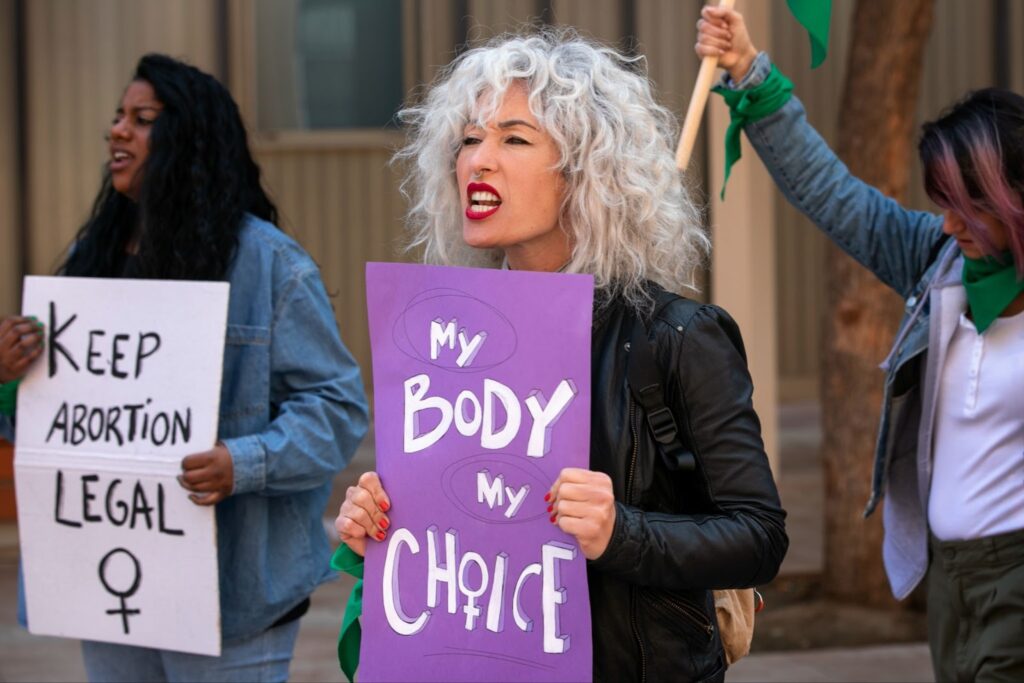Since the landmark Roe v. Wade decision by the U.S. Supreme Court on January 22, 1973, abortion has been deemed legal across all states within the United States. However, individual states retain the authority to enact their own sets of regulations and constraints surrounding this issue.
As early as 1970, New York distinguished itself by enacting the most liberal abortion legislation in the nation, positioning itself as a sanctuary for individuals seeking to exercise their right to reproductive choice.
Within New York’s jurisdiction, there exists no requirement for waiting periods or mandatory involvement of parents, nor are there limitations on abortions funded by public resources. The decision to undergo an abortion is entirely at the discretion of the individual, without necessitating the consent of their partner or parents—affirming the principle of bodily autonomy and the right to choose.
In cases where the individual seeking abortion is a minor below the age of 18 but possesses the capacity for informed consent, parental or guardian authorization is not obligatory. Informed consent entails a comprehensive understanding of the risks, advantages, and alternatives associated with the procedure, encompassing the option of forgoing it altogether.
Despite the comparatively relaxed regulations, New York State maintains legal frameworks that define and govern the practice of abortion within its jurisdiction.
New York Abortion Laws: A Detailed Overview
In the complex landscape of federal and state legislations, understanding abortion laws is paramount. While each state has its own regulations regarding abortion, New York is no exception. The state has specific laws and restrictions related to abortion that are crucial to comprehend for anyone seeking this service.
Under New York law, regulations related to abortion can be found under code sections: Penal §125.05, §125.20, §125.40-60; and Public Health §4164. These sections detail the circumstances and parameters for lawful abortions, as well as the consequences for illegal abortions.
Understanding the Legal Definition of Abortion in New York
In New York, an abortion is considered legal under two primary circumstances:
- The abortion is conducted during the initial 24 weeks of pregnancy;
- The abortion is deemed necessary for protecting the life of the pregnant person.
However, it’s not enough for the abortion to simply fall within one of these categories. For an abortion to be legally performed by the pregnant person themselves, it must also be carried out based on the advice of a certified Medical Doctor (M.D). This guideline further cements the importance of professional medical advice and oversight throughout the process.
Distilling the Definition of Illegal Abortion
On the other side of the coin, New York law defines illegal abortion based on certain factors. These factors can be categorized as follows:
- Non-compliance with the standards for legal abortion, such as failing to consult with an M.D. or perform the procedure during the prescribed gestational period;
- If the abortion results in the death of the patient, which underscores the importance of proper medical supervision and adherence to safety standards;
- If the abortion is performed beyond the 24-week mark, unless it is imperative to save the life of the pregnant person.
An important facet to note is the illegal use of drugs to induce miscarriage. Administering or consuming drugs with the intent of causing a miscarriage is regarded as illegal under New York law. Such actions pose serious health risks and are contrary to established medical practices. As such, it’s essential for individuals to seek professional medical advice and services when considering abortion.
This article provides a rundown of New York’s abortion laws. However, laws can change, and this information may not include the most recent legislative amendments. Always consult legal professionals or trusted health service providers for up-to-date information.
An In-Depth Look at Abortion Regulations in New York
Each state in the United States, New York included, has specific regulations in place to govern abortions. These laws are vital for maintaining the safety and health of those involved.
New York State law covers abortion regulations under several legal code sections. These include Penal §125.05, §125.20, §125.40-60, and Pub. Health §4164. Reading these sections provides a comprehensive understanding of the precise legal language used in these regulations.
The Legal Parameters of Abortion in New York
The legal framework for abortion in New York is quite explicit. For an abortion to be considered legally permissible:
- It must occur within the first 24 weeks of pregnancy;
- The procedure is deemed necessary to preserve the life of the pregnant individual;
- If the pregnant individual decides to undergo an abortion, it must be based on the advice of a certified Medical Doctor (M.D) and executed within the specified time frame or when their life is in danger.
These regulations highlight the importance of seeking professional medical advice and emphasize the crucial role of qualified medical practitioners when considering this process.
When Does Abortion Become Illegal in New York?
It is equally vital to be aware of the circumstances that render an abortion illegal in New York. These include:
- Non-compliance with the standards for legal abortion, such as failing to consult with an M.D or not adhering to the designated gestational period;
- The death of the patient resulting from the procedure. This underlines the importance of thorough medical supervision and strict adherence to safety standards;
- Performance of the procedure beyond the 24-week mark, barring cases where it’s essential to preserve the life of the pregnant person.
The ingestion or administration of drugs with the intention of inducing a miscarriage is strictly illegal under New York law. Such actions can pose serious health risks and are a violation of established medical practices. The law emphasizes the need for individuals to seek professional medical advice and services when considering abortion, instead of resorting to potentially harmful self-induced methods.
Exceptions and Special Conditions
New York law acknowledges the need for exceptions in certain circumstances. If the life of the pregnant person is at risk, the law permits an abortion to be performed beyond the 24-week gestational limit. This highlights the significance placed on preserving the life of the pregnant individual.
Penalties for Unlawful Abortion in New York
In the event of a violation of these laws, the state of New York has established penalties. The exact nature and severity of these penalties can vary depending on the specifics of the violation, reflecting the seriousness with which the state treats these regulations.
It is important to remember that while this article provides a comprehensive summary of New York’s abortion laws, legal provisions can change over time. Always consult a legal professional or trusted health service provider for the most accurate and up-to-date information.
Diving Deeper into New York’s Abortion Consent Laws
Unlike many states that mandate parental involvement for minors or need spousal consent, New York’s law is straightforward. The only consent needed for an abortion is from the person undergoing the procedure themselves, even if they are a minor. This reflects the state’s approach of prioritizing individual autonomy and personal choice in reproductive decisions.

Absence of a Waiting Period in New York
Close to half of all states in the U.S. mandate a 24-hour waiting period prior to an abortion. Some even necessitate multiple clinic visits from the initial consult to the procedure. However, in New York, there is no such compulsory waiting period. This is designed to reduce potential access barriers to this critical healthcare service.
The Role of Licensed Medical Doctors in New York Abortion Procedures
In line with best medical practices and safeguarding patient safety, New York law decrees that abortions must be performed only by a licensed Medical Doctor (M.D). This requirement ensures that the procedure is carried out by trained professionals, reducing possible risks and complications.
Patient Residency and New York Abortion Laws
New York stands out for its inclusive approach towards non-residents seeking abortion services within the state. Regardless of residency status, anyone can legally have an abortion performed in New York. This provision caters to many individuals who may live in states with stricter abortion laws and are traveling to New York to access these medical services.
These aspects highlight New York’s commitment to making abortion services accessible and safe for all who need it. It is crucial to note that while this article provides a thorough summary of the law, legislative provisions can change, and this information may not include the most recent updates. Always consult a legal expert or a trusted health care provider for the most current and accurate information.
Key Supreme Court Decisions Shaping Abortion Laws in the U.S
The Supreme Court of the United States played a pivotal role in shaping abortion law, and no case has been more influential than Roe v. Wade in 1973. The ruling was groundbreaking, with the Supreme Court deciding 7-2 that laws criminalizing abortion infringed on a woman’s constitutional right to privacy. However, they also recognized the state’s vested interest in preserving the health and wellbeing of pregnant women and the potential for human life.
A Closer Look at the Roe v. Wade Ruling
The landmark judgment, rather than providing an unrestricted right to abortion, balanced the rights and interests of the individual seeking an abortion and the state’s obligation to regulate the medical profession and safeguard public health. Here is the trimester-wise breakdown of the judgment:
- First Trimester: The Court ruled that the state’s role should be minimal, only to the extent of ensuring that abortions are undertaken by a licensed doctor under medically safe conditions. This ruling affirmed the constitutional right to privacy and bodily autonomy for pregnant individuals;
- Second Trimester: The judgment allowed state regulation of abortion during this period but set parameters, stating that regulations should be reasonably related to preserving the health of the pregnant person;
- Third Trimester: In this phase, the Court held that the state’s interest to protect potential human life outweighs a woman’s right to privacy, permitting the state to ban abortions. However, an exception was made when an abortion is necessary to protect the life or health of the mother.
Further cementing the constitutional perspectives, the Court determined that a fetus does not qualify as a “person” under the U.S Constitution, thereby lacking explicit protection.
This Supreme Court ruling has since provided the legal foundation around which all subsequent federal and state abortion laws have been developed and judged. It remains a fundamental reference point, highlighting the complex balance between individual rights and state interests that continue to inform the national conversation around abortion.
The Necessity of Quality Care During Abortion
Choosing the right healthcare provider is crucial when contemplating an abortion. The process is simplified and de-stressed significantly when the medical team includes compassionate, experienced, and Board-Certified gynecologists who can empathize with the patient’s situation and provide expert care.
The chosen medical facility should not just have competent staff, but also advanced facilities, providing varied abortion methods, transportation services, and minimal wait times to consult a physician. The facility should also prioritize patient privacy and safety, and provide a comfortable environment.
Eastside Gynecology in New York City is one such facility that stands out in offering high-quality care, round trip transportation services, and exclusive VIP rooms to ensure privacy and comfort for its patients.
When faced with an unexpected pregnancy and considering an abortion, remember that you are not isolated. Every year, a diverse array of women across different races, religious beliefs, and economic backgrounds opt for abortion in the United States. In fact, about 100,000 abortions are provided annually in New York, serving both residents and women from other states.
Despite the stigma attached to it, abortion is one of the safest surgical procedures for women in the United States, with fewer than 0.05% of patients experiencing any complications.
New York, being a more liberal state, acts as a safe haven for many women seeking abortion services. Facilities like Eastside Gynecology present a beacon of hope, providing comprehensive, empathetic care to those in need. It is essential to make informed decisions, seek out the best care available, and remember that support is available at every step of the way.
Conclusion
In conclusion, New York stands as a trailblazer in upholding reproductive rights and bodily autonomy, providing a model of progressive legislation within the United States. Through its comprehensive approach to abortion laws, the state ensures that individuals have the freedom to make informed decisions about their reproductive health without unnecessary barriers or interference. As debates surrounding abortion continue to evolve, New York’s commitment to safeguarding these fundamental rights serves as a testament to the importance of prioritizing individual agency and dignity in matters of reproductive choice.



